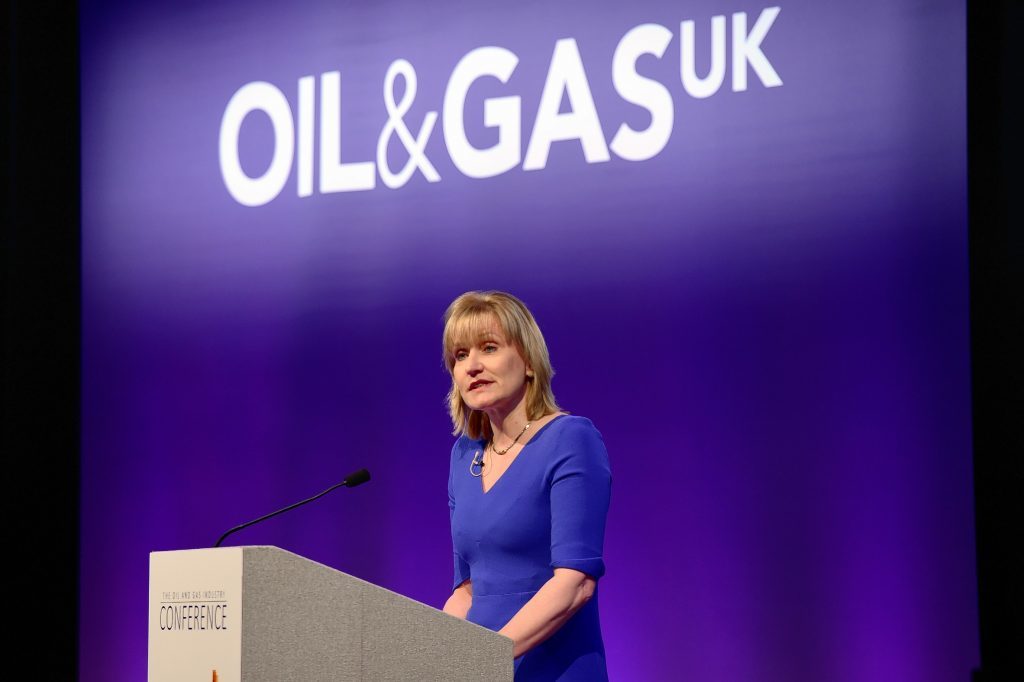
North Sea industry is in a better place after three tough years, but fresh thinking and new ways of working will be needed to help plot a course to a sustainable future, the head of Oil and Gas UK (OGUK) has said.
Deirdre Michie, who took on the role in 2015 after many years with energy giant Shell, said the oil industry has shown it can improve in terms of costs, efficiency and collaboration.
In its 2017 economic report, OGUK said operators have almost halved lifting costs since 2014, while production had jumped 16%.
Meanwhile, mergers and acquisition activity in 2017 provided a “tentative sign” that investor confidence has started to return.
Less positive is that fact that the number of jobs supported by the oil and gas sector has dropped by about a third since 2014 to 300,000.
Ms Michie acknowledged companies have had to make difficult decisions during the downturn but said the sector has become more competitive.
And she is confident oil and gas companies will play a key role as the UK moves towards a lower carbon economy.
She said: “The industry is much leaner and more efficient, but there is more to do. In any credible scenario, oil and gas are going to be a major part of the energy mix for many years to come.
“For example, even as we move towards electric cars, we will still need gas to help generate additional electricity to power them and we will need oil for the composites that make up the cars themselves.”
Many companies in the industry are already showing they are ready and able to adapt to the new world and the opportunities it can bring.
Ms Michie, who held a range of senior positions at Shell – commercial, contracting and procurement and communications – said new ways of thinking will always be needed to ensure the oil and gas industry continues to prosper.
“We need people with different ways of thinking, and different ways of working,” she said.
“We need to attract all sorts of people to help us make the transition.”
Ms Michie said it is vital to have a diverse workforce in industry and the inclusion of all types of people and thinking to help the sector evolve.
“It’s not just about gender, although women are still under represented in our industry,” she said.
“As we look ahead we will be stronger and better equipped for the challenges we face if we can do more on achieving wider representation.”
It helps that the case for better representation in the workplace has been put forward convincingly. Studies have shown that businesses get better results if they have a more balanced workforce.
“That’s been proven so we don’t have to keep reinforcing that,” Ms Michie said. “Instead we can move onto considering how we get there.”
Ms Michie recalled her introduction to the industry in the downstream segment. The graduate programme she joined took on equal numbers of men and women, which was unusual for the time. But at one conference she was the only woman out of 700 attendees.
“The workplace still felt very male oriented,” she said. “I haven’t forgotten that conference, and while we are still not at 50:50 we have got a lot better.
“I have experienced discrimination, not necessarily overtly, but there has certainly been an element of what we now call unconscious bias.”
Ms Michie is adamant more can be done not only to attract women to oil and gas, but to also keep them progressing thereafter.
“The direction this industry will go in in terms of technology, data and analytics can be attractive to women and encouraging girls to get excited about STEM subjects will be key,” she said.
“But we also need to get women to stay in the industry and we need to make every effort to ensure they see this as a place they can have a compelling and rewarding career.
“We have to be thoughtful about supportive policies, flexible working, providing role models and mentoring.”
Ms Michie said she felt privileged that there have been more women on the board of OGUK than ever before.
Having the likes of Chevron’s Greta Lydecker, ConocoPhillips’ Terri King and Total’s Elisabeth Proust has “changed the dynamic” of conversations.
Ms Michie said: “They’ve been really helpful in moving the agenda along in a collaborative and dynamic way.
“There are more across the industry from Colette Cohen of the OGTC to Hedda Felin at Statoil, Gwen Boyault at Schlumberger, Michelle Handworth now at Aberdeen Harbour and Sian Rees Lloyd at Aker.
“Of course there is still a way to go, but what I’m seeing is more encouraging. And it’s great that at the next generation, we have a critical mass of talented and motivated women coming through.
“They are the ones we need to collectively support, sponsor and mentor as well as ensure we have the right policies in place and in this way we will get the right balance that will deliver for industry for years to come. As we look ahead, the sum of our activities will be greater if we co-ordinate rather than compete, that is where Oil & Gas UK has an important role to play.”
Recommended for you

